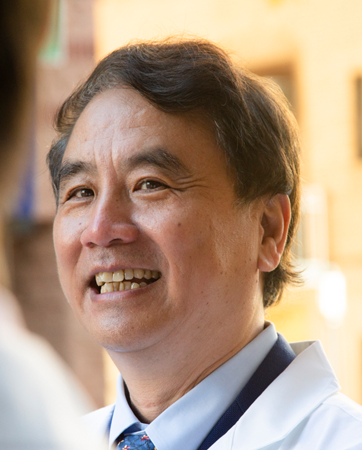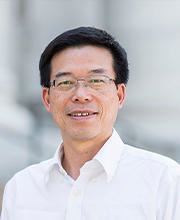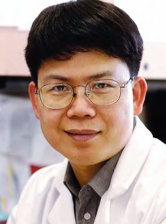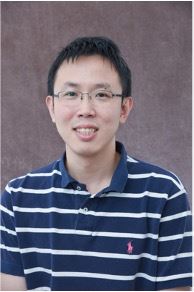- Home
- Membership
- Awards
SCBA Awards
Nominations for the Presidential Award,
Kenneth Fong Young Investigator Award, and the Lifetime Achievement Award.
Information about each award can be found by clicking here.
The Nomination Form can be found by clicking here.
SCBA Presidential Award
The SCBA Presidential Award is for a senior scientist whose cutting-edge scientific contribution in biosciences is globally recognized. His/her publications are frequently cited by peers, and he/she is regarded as a leader of his/her research field of excellence.
2022 University of Oxford |
2022 Harvard University |
2019 University of Texas Dr. Chen receives the 2019 SCBA Presidential Award for the discovery of cyclic GMP-AMP synthase (cGAS) as a cytosolic DNA sensor and a new cyclic di-nucleotide signaling pathway that mediates innate immune responses in animal cells. |
2017 National Heart, Lung and Blood |  2017 Yale University |
2015 National Institute of Diabetes and Digestive and Kidney Diseases Dr. Yang receives the 2015 SCBA Presidential Award for her exceptional and groundbreaking achievements and leadership in structural biology, especially on mechanisms in DNA recombination and genome mutations. |
2013 The National Institute of Biological Sciences |
2011 University of Texas |
SCBA Lifetime Achievement Award
The SCBA Lifetime Achievement Award is for an outstanding senior scientist, who is a recognized world leader with exceptional achievements in his/her field and has made significant contributions in a lifelong career. The Lifetime Achievement Award is presented at irregular intervals, depending on availability of qualified candidates.
2019 James C. Wang Harvard University Dr. Wang receives the 2019 Lifetime Achievement Award for his discoveries in DNA topoisomerases and solving the long-standing topological problem in DNA replication and transcription. Dr. Wang has set a rare example of taking a fundamental discovery from its inception to a deep understanding of biological mechanism. His work laid foundation for developing inhibitors of topoisomerases broadly used as antibiotics and in cancer treatment.
2013 Sophia and Ming-Jer Tsai Baylor College of Medicine | 2017 Mien-Chie Hung University of Texas M.D. Anderson Cancer Center | 2015 Horace H. Loh University of Minnesota Medical School Dr. Loh receives the 2015 Lifetime Achievment Award for his distinguished career, pioneering achievements and leadership in biochemical neuropharmacology, especially on the neurochemical mechanisms of opioid addiction. |
SCBA Kenneth Fong Young Investigator Award
The SCBA Kenneth Fong Young Investigator Award is for a young scientist, who is recognized as a rising star in bioscience. The candidate’s level should be at early or intermediate stages of scientific career development in academia or biotechnology industry. The candidate’s age must be 45 or younger in the year that the international symposium is held.
2022 Xiaochen Bai University of Texas Southwestern Medical Center |
2022 Shanley Lei Qi Stanford University |
2019 Meng (Carla) Wang Dr. Wang receives the 2019 Kenneth Fong Young Investigator Award for her seminal work on molecular mechanisms that govern somatic aging, reproductive senescence, and lipid metabolism. Her research harnesses the power of functional genomics, metabolomics, chemical engineering and optical biophysics. She has discovered the lysosome-to-nucleus retrograde lipid messenger pathway and bacteria-derived metabolites in mediating host metabolism and longevity. | 2019 Xin Chen Johns Hopkins University Dr. Chen receives the 2019 Kenneth Fong Young Investigator Award for her seminal work on the epigenetic regulation in adult stem cell lineages. Her studies have led to the discovery that epigenetic information is asymmetrically inherited in stem cells. Dr. Chen’s recent studies illuminate that both DNA replication and mitotic cell division contribute to establishing and partitioning such an epigenetic asymmetry. | 2017 Feng Shao The National Institute of Biological Sciences |
2015 Nieng Yan Tsinghua University Dr. Yan receives the 2015 Kenneth Fong Young Investigator Award for her exceptional and groundbreaking achievements in the field of structural biology and membrane protein biochemistry, especially on the structural and mechanistic understanding of the major facilitator superfamily of transporters. | 2015 Hongjun Song Johns Hopkins University School of Medicine Dr. Song receives the 2015 Kenneth Fong Young Investigator Award for his exceptional and groundbreaking achievements in the neuroscience and stem biology fields, especialy elucidating the mechanisms and functions of neutral stem cells and neurogenesis in mammalian brain. | 2013 Hui-Kuan Lin University of Texas M.D. Anderson Cancer Center
Targeting ubiquitin pathways for cancer therapy |
2011 Yingzi Yang National Human Genome Research Institute National Institutes of Health |








